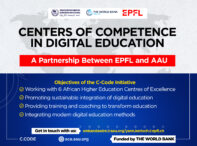For immediate release 9th July 2021
AAU and EPFL launch the Centers of Competence in Digital Education Initiative
Accra, Ghana, 9th July 2021 – The Association of African Universities under the Africa Higher Education Centers of Excellence for Development Impact (ACE Impact) Project in collaboration with the EPFL – École polytechnique fédérale de Lausanne (Switzerland) have launched the Centers of Competence in Digital Education (C-CoDE) Initiative. The AAU as the regional facilitating unit of the ACE Impact Project is using a portion of its World Bank regional International Development Association (IDA) grant to fund the activities of this initiative. EPFL, a World Class University of Technology in Switzerland, is also a leader in digital education.
Six (6) ACE Impact host Universities will be competitively selected and supported to strengthen themselves and establish Centers of Competence in Digital Education on their campuses to promote the sustainable integration of digital education in the teaching processes, as a means of strengthening the quality of teaching as well as the competencies of graduates. The pilot initiative will provide the participating institutions with the necessary training and coaching to transform their educational curricula by integrating modern digital education methods. Each selected University will commit some funding from their ACE Impact project (s) towards acquisition of the necessary equipment and venue to house their C-CoDE. 30 faculty, 3 pedagogy engineers and 2 technical specialists will be trained in each Center by the end of the project. The pilot will be implemented from September 2021 to July 2022.
Selected Centers will contribute to the design, production and dissemination of Massive Open Online Courses (MOOCs) and Open Educational Resources (OER). The broader goal is for the selected Centers to eventually serve other African institutions using a training-the-trainers model, within the broader ACE Impact project portfolio and beyond – across the Sub-Saharan Africa (SSA) region.
Note to Editors
For further information, kindly contact Dr Sylvia Mkandawire via smkandawire@aau.org and copy Mr Yann Kerloch yann.kerloch@epfl.ch
Background information
The Africa Higher Education Centres of Excellence (ACE) Project is a World Bank initiative in collaboration with governments of participating countries to support Higher Education institutions in specializing in Science, Technology, Engineering and Mathematics (STEM), Agriculture, and Health. The Project aims to promote regional specialization among participating universities in areas that address specific common regional development challenges. It also strengthens the capacities of these universities to deliver high quality training and applied research as well as meet the demand for skills required for Africa’s development. Based on the initial successes, the World Bank and the French Development Agency (AFD) in collaboration with the African governments, launched the ACE Impact Project in 2018 to strengthen post-graduate training and applied research in existing fields and support new fields that are essential for Africa’s economic growth. There are 43 ACEs (25 new ones and 18 from ACE l); 5 Emerging Centers;l “top up” center in Social Risk Management; and 5 Colleges and Schools of Engineering.
About the Association of African Universities (AAU)
The Association of African Universities is an international non-profit, non-governmental organization created by African Universities to promote cooperation among them on the one hand, and between them and the international academic community on the other. Created in 1967, the AAU is the voice of higher education in Africa. AAU aims to improve the quality of African higher education, and to strengthen its contribution to Africa’s development by supporting the core functions of higher education institutions and facilitating critical reflection and consensus building on issues affecting higher education in Africa. The AAU is the Regional Facilitation Unit of the Africa Centres of Excellence project.
About the World Bank Group
The World Bank Group is a multilateral development institution that works to reduce poverty. Its subsidiary IDA (International Development Association) finances the Africa Centres of Excellence series of projects. Established in 1960, IDA helps the world’s poorest countries by providing grants and low to zero-interest loans for projects and programs that boost economic growth, reduce poverty, and improve poor people’s lives. IDA is one of the largest sources of assistance for the world’s 75 poorest countries, 39 of which are in Africa. Resources from IDA bring positive change to the 1.5 billion people who live in IDA countries. Since 1960, IDA has supported development work in 113 countries. Annual commitments have averaged about $18 billion over the last three years, with about 54 percent going to Africa.
About the French Development Agency
For more than 75 years, the French Development Agency (AFD) has been fighting global poverty by supporting policies and investments that benefit the poorest populations. Strengthening the social link between individuals, groups and territories is now at the heart of its actions in education, health, employment, urban planning, climate or biodiversity. For AFD, balanced development requires a real reduction in inequalities.
About EPFL (École polytechnique fédérale de Lausanne)
About EPFL (École polytechnique fédérale de Lausanne). EPFL is Europe’s most cosmopolitan technical university with students, professors, and staff from over 120 nations. Founded in 1853, the École Spéciale de Lausanne was renamed École polytechnique fédérale de Lausanne in 1969. EPFL is a research-intensive institution specializing in Science, Technology and Engineering with a strong focus on Life Science and Digital Sciences. It is one of the two Swiss Federal Institutes of Technology, and it has three main missions: education, research and technology transfer. EPFL is a bilingual Technological University (French-English) located on the shores of Lake of Geneva in Lausanne (Switzerland). EPFL works together with an extensive network of partners including other universities and institutes of technology, secondary schools and colleges, industry and economy, political circles and the general public, to bring about real impact for society.
